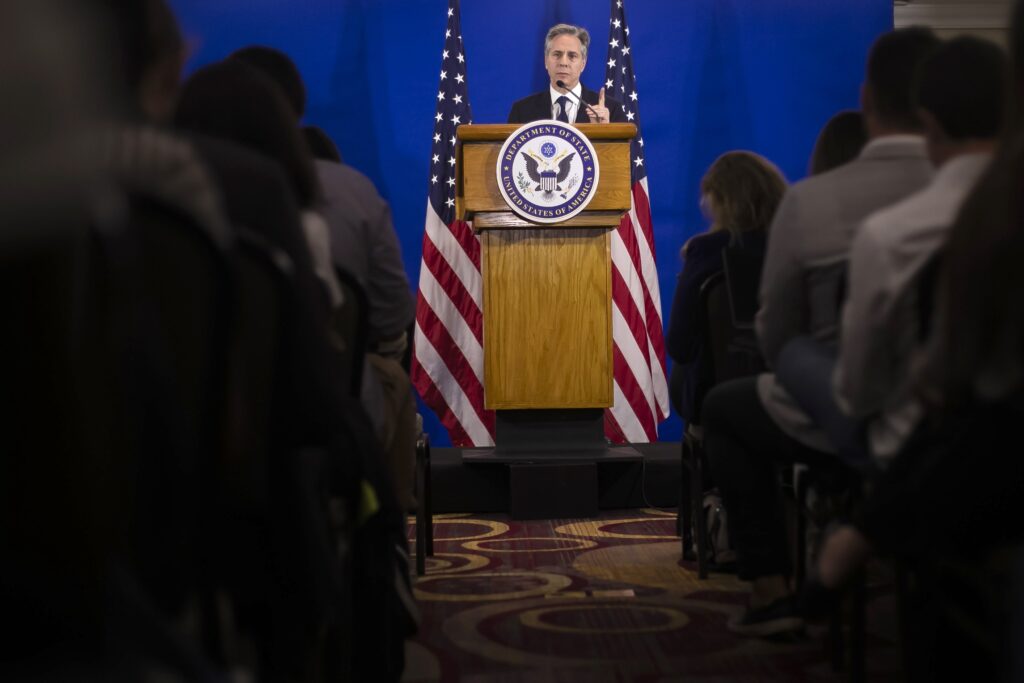Brazil and the United States can pursue a strong and friendly relationship despite a disagreement about whether Israel’s war against Hamas should be likened to the Holocaust, Secretary of State Antony Blinken assessed.
“Obviously, the comparison of Gaza to the Holocaust, we profoundly disagree,” Blinken told reporters in Rio de Janeiro. “But that’s also something that friends do. We can have these disagreements, even profound disagreements on one particular issue — or, I should say, even an aspect of the issue — and still continue all of the vital work that we’re doing together.”
Blinken visited the South American power in order to meet with Brazilian President Luiz Inacio Lula da Silva and attend the G20 foreign ministerial, which Brazilian officials are hosting this year. The Brazilian president, a left-wing politician who has portrayed himself as an ideological ally of U.S. progressives, set the stage for his meeting with Blinken by accusing Israel of perpetrating “a genocide” in Gaza.
“What is happening in the Gaza Strip with the Palestinian people has no parallel in other historical moments,” Lula said while attending the African Union Summit in Ethiopia. “In fact, it did exist when Hitler decided to kill the Jews.”
That remark infuriated Israeli officials, who summoned the Brazilian ambassador to the Yad Vashem Holocaust memorial in Jerusalem to deliver a public rebuke.
“Tell President Lula that he is persona non grata in Israel until he retracts his statements,” Israeli Foreign Minister Israel Katz told Brazilian Ambassador Federico Mayer on Monday. “The comparison between Israel’s just war against Hamas and the atrocities of Hitler and the Nazis is a disgrace and a severe antisemitic attack.”
The remark underscored the diplomatic tensions that can arise from Lula’s ideological positioning. The Brazilian leader backed the expansion of BRICS, in a perceived diplomatic victory for Chinese General Secretary Xi Jinping and Russian President Vladimir Putin, and he offered that denunciation of Israel while visiting one of the new entrants. Blinken’s team views Brazil and Argentina — which the top U.S. diplomat will also visit this week — as “two of our most important partners in the Americas,” as one top State Department official put it last week.
“In so many ways, the vision that President Lula brings is the same vision that President Biden has,” he said Thursday. “And, as a representative of President Biden, my purpose was really to continue to deepen that common approach and continue to look at practical ways we can advance it.”

Blinken rejected Lula’s characterization of the war in Gaza at the outset of his meeting with the president on Wednesday, according to U.S. and Israeli officials.
“Secretary Blinken explained the U.S. position in Gaza,” Lula’s foreign policy adviser, Celso Amorim, told the New York Times. “President Lula reiterated his shock and horror at the slaughter there, while also reiterating that he strongly condemned what Hamas had done.”
Blinken emphasized Thursday that Brazil and the United States are combining to address “the challenge of food insecurity and global hunger,” which has been exacerbated by Russia’s war in Ukraine, and that the two presidents “are joined profoundly by their commitment to protecting worker rights” and also working to protect the Amazon rainforest.
“We’re all seized with the obligation of contending with the one existential threat to humanity, and that’s climate change,” Blinken said. “And our countries have been leaders on that.”
CLICK HERE TO READ MORE FROM THE WASHINGTON EXAMINER
Amorim assessed that Blinken’s meeting with Lula “reinforced our friendship,” and Blinken offered a similar view.
“The quality of the conversation, the exchange with President Lula — I, on behalf of the United States, could not have been more pleased,” he told reporters. “We were focused almost entirely on the very important and powerful common agenda that the United States and Brazil share when it comes to the big challenges of our moment. And doing so in ways that improves the lives of people in Brazil, the United States, and around the world.”
